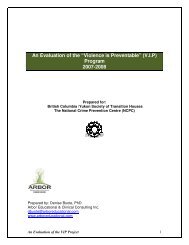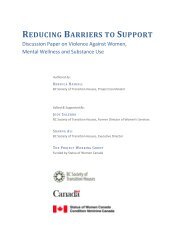An Evaluation of the Violence is Preventable (VIP) Program
An Evaluation of the Violence is Preventable (VIP) Program
An Evaluation of the Violence is Preventable (VIP) Program
Create successful ePaper yourself
Turn your PDF publications into a flip-book with our unique Google optimized e-Paper software.
<strong>Evaluation</strong> Questions<br />
For <strong>the</strong> purposes <strong>of</strong> th<strong>is</strong> evaluation, <strong>the</strong> impact <strong>of</strong> three key program activities was considered:<br />
1. Awareness presentations: These presentations are aimed to educate adults (e.g.<br />
educators, parents, etc.) about to <strong>the</strong> impact <strong>of</strong> domestic violence on children and youth.<br />
2. <strong>Violence</strong> prevention presentations: These presentations are designed for classrooms<br />
with children from kindergarten to grade 12 in order that children and youth can learn<br />
about domestic violence. Presentations take a preventative focus and include<br />
d<strong>is</strong>cussions and activities designed to foster positive communication skills, increased<br />
self-esteem and an understanding <strong>of</strong> healthy relationships.<br />
3. Group interventions: These interventions are for children and youth who have been<br />
exposed to domestic violence. Multi-week cycle educational groups are <strong>of</strong>fered to<br />
children and youth in order that <strong>the</strong>y may get <strong>the</strong> support <strong>the</strong>y need to reduce <strong>the</strong><br />
negative impact that domestic violence has had on <strong>the</strong>ir lives.<br />
Through <strong>the</strong> above activities, <strong>the</strong> evaluation questions addressed from <strong>the</strong> data collected during<br />
<strong>the</strong> fall <strong>of</strong> 2008 focus on three program domains: capacity building; educator awareness and;<br />
services for students. <strong>Evaluation</strong> questions are presented below:<br />
Domain<br />
Capacity Building<br />
Educator Awareness<br />
and School Culture<br />
Change<br />
Services for Students<br />
<strong>Evaluation</strong> Questions<br />
1. Has <strong>the</strong> <strong>VIP</strong> program increased <strong>the</strong> capacity <strong>of</strong> community-based<br />
CWWA programs and schools to work toge<strong>the</strong>r to address needs <strong>of</strong><br />
all students<br />
2. Is <strong>the</strong>re an increase in awareness <strong>of</strong> educators regarding <strong>the</strong> impact<br />
<strong>of</strong> domestic violence exposure on students<br />
3. Is <strong>the</strong>re an increase in educator knowledge regarding how <strong>the</strong>y can<br />
recognize and support children and youth who have been exposed<br />
to domestic violence<br />
4. Has <strong>the</strong>re been a streng<strong>the</strong>ning <strong>of</strong> student (including Aboriginal,<br />
immigrant/refugee students) ability in <strong>the</strong> following areas: getting<br />
along with o<strong>the</strong>r students, l<strong>is</strong>tening, expressing feelings, resolving<br />
conflict non-violently, seeking help when needed, and attending<br />
school regularly<br />
5. Has <strong>the</strong>re been an increase in knowledge about factors contributing<br />
to a healthy relationship<br />
9 | F a l l 2 0 0 8 V I P E v a l u a t i o n






